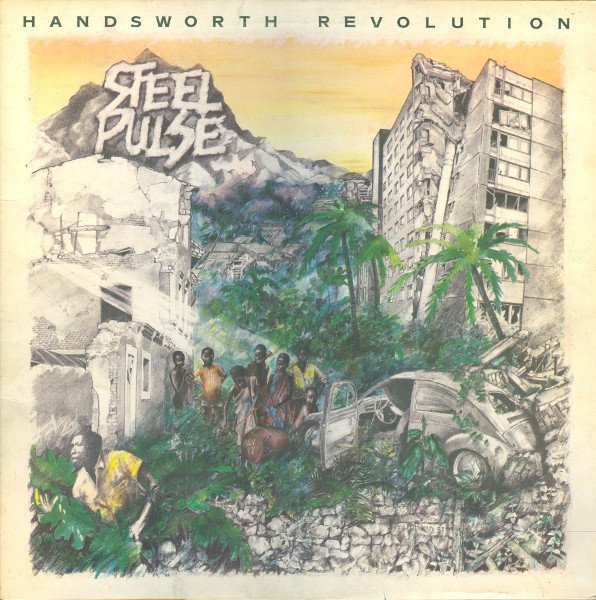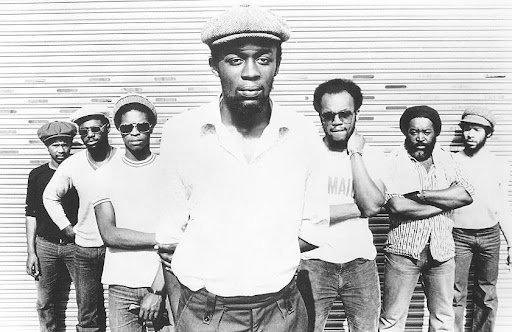
In 1978, reggae was already a global force, but in the UK, it had a different pulse—one shaped by the struggles and resilience of the Caribbean diaspora. Handsworth Revolution, the debut album by Birmingham’s Steel Pulse, captured this energy like no other British reggae album before it. Named after the Handsworth district, a working-class area home to a large West Indian community, the record reflected the racial tensions, police harassment, and socio-political struggles faced by Black Britons at the time. Against a backdrop of economic hardship, rising
nationalism, and the growing influence of the Rock Against Racism movement, Handsworth Revolution was more than just a record—it was a statement. Unlike many reggae albums coming out of Jamaica, which often focused on Rastafarian spirituality or broader themes of oppression, Steel Pulse’s debut was sharply focused on their immediate reality, giving voice to a generation that felt unheard. Sonically, the album blended the deep-rooted grooves of traditional reggae with a sharper, more militant edge, drawing from rock, jazz, and funk to create a sound that was both fresh and powerful.

Recorded at Island Studios in London and produced by Karl Pitterson, who had previously worked with Bob Marley & The Wailers, Handsworth Revolution was released on August 28, 1978, through Island Records. The album was meticulously crafted, featuring intricate arrangements and a level of production that set it apart from many of its contemporaries. Steel Pulse’s lineup at the time was David Hinds (vocals, rhythm guitar), Basil Gabbidon (lead guitar, vocals), Ronald McQueen (bass), Steve “Grizzly” Nisbett (drums), Selwyn Brown (keyboards, vocals), and Michael Riley (vocals, percussion). The sessions captured the raw energy of the band’s live performances while refining their sound into a polished, cohesive statement. The album’s production leaned on crisp drum patterns, deep basslines, bright horn arrangements, and layered harmonies that enhanced the impact of their politically charged lyrics.

The opening track, “Handsworth Revolution”, immediately sets the tone for the album. From its haunting, atmospheric intro, the song builds into a militant roots reggae anthem, driven by Ronald McQueen’s hypnotic bassline and David Hinds’ impassioned delivery. The lyrics paint a vivid picture of Handsworth’s struggles, calling for unity and resistance against oppression. The combination of the rolling rhythm, bright guitar skanks, and a deep, almost cinematic brass section creates a sense of urgency that makes it impossible to ignore. This was more than just reggae—it was a battle cry for Britain’s marginalized youth.
“Prodigal Son” follows, bringing a slightly more introspective energy while maintaining the album’s revolutionary spirit. Built around a smooth yet driving groove, the track explores themes of redemption and self-discovery, using biblical imagery to frame a personal and collective journey of awakening. The rich vocal harmonies elevate the song, blending seamlessly with the bubbling bassline and warm, organ-infused production. The track’s slower, hypnotic tempo contrasts beautifully with the urgency of Handsworth Revolution, showcasing the band’s ability to balance intensity with melody.
“Soldiers” is another standout, a call to arms that blends military-style drum patterns with a deeply melodic chorus. The song addresses the need for unity and resilience, urging young Black Britons to stand strong in the face of adversity. The rhythm section is particularly tight here, with Steve Nisbett’s drumming providing a rock-solid foundation while the horns and guitars dance around the groove. The song’s infectious chorus makes it one of the most anthemic moments on the album, proving that Steel Pulse knew how to make revolutionary messages both powerful and accessible..
“Klu Klux Klan” is perhaps the album’s most confrontational moment. With its eerie, descending intro and relentless bass groove, the track takes direct aim at racism and the rise of far-right groups in Britain during the late ‘70s. The call-and-response vocals amplify the urgency of the message, while the instrumentation remains tight and punchy, giving the song an almost cinematic feel. The decision to name the song after America’s most infamous white supremacist group was a bold one, leaving no room for ambiguity in its condemnation of racial violence. The track was also one of the album’s singles, and its impact extended beyond the reggae community, making it a defining moment for political music in Britain.Klu Klux Klan is perhaps the album’s most confrontational moment. With its eerie, descending intro and relentless bass groove, the track takes direct aim at racism and the rise of far-right groups in Britain during the late ‘70s. The call-and-response vocals amplify the urgency of the message, while the instrumentation remains tight and punchy, giving the song an almost cinematic feel. The decision to name the song after America’s most infamous white supremacist group was a bold one, leaving no room for ambiguity in its condemnation of racial violence. The track was also one of the album’s singles, and its impact extended beyond the reggae community, making it a defining moment for political music in Britain.
“Bad Man” rounds out the album’s key tracks with a haunting, minor-key groove that explores themes of corruption and injustice. The deep, rolling bassline drives the song, while Hinds’ vocals shift between a melodic croon and sharp, almost spoken-word delivery. The song’s arrangement is particularly striking, using subtle synth flourishes and echoing guitar lines to create a sense of paranoia and unease. It’s a testament to Steel Pulse’s ability to convey deep emotions through both lyrics and musical textures, making Bad Man one of the most cinematic tracks on the album.
Among the singles released from Handsworth Revolution, Klu Klux Klan stands out as the most well-known, with its militant stance against racism striking a chord with audiences beyond reggae’s usual fanbase. The track’s heavy bass and dramatic horn section added to its impact, making it a defining song of British reggae. The title track, Handsworth Revolution, was another powerful single, with its urgent energy capturing the social climate of the time. Both songs served as rallying cries for young Black Britons and cemented Steel Pulse’s reputation as one of reggae’s most politically charged bands.

Handsworth Revolution is more than just an album—it’s a historical document, a bold artistic statement, and a testament to reggae’s ability to be both deeply personal and fiercely political. It captures a specific moment in time while remaining eerily relevant decades later. The album’s fusion of tight musicianship, intricate arrangements, and urgent messages makes it a must-listen for anyone interested in reggae’s evolution, British music history, or social justice anthems. If you haven’t yet experienced Handsworth Revolution, now is the time. First, because its messages of resistance and unity are just as vital today as they were in 1978. Second, because the musicianship on this record is top-tier, offering some of the tightest grooves and richest arrangements in reggae history. And finally, because this album represents reggae at its most powerful—a voice for the unheard, a sound of defiance, and a celebration of resilience.

